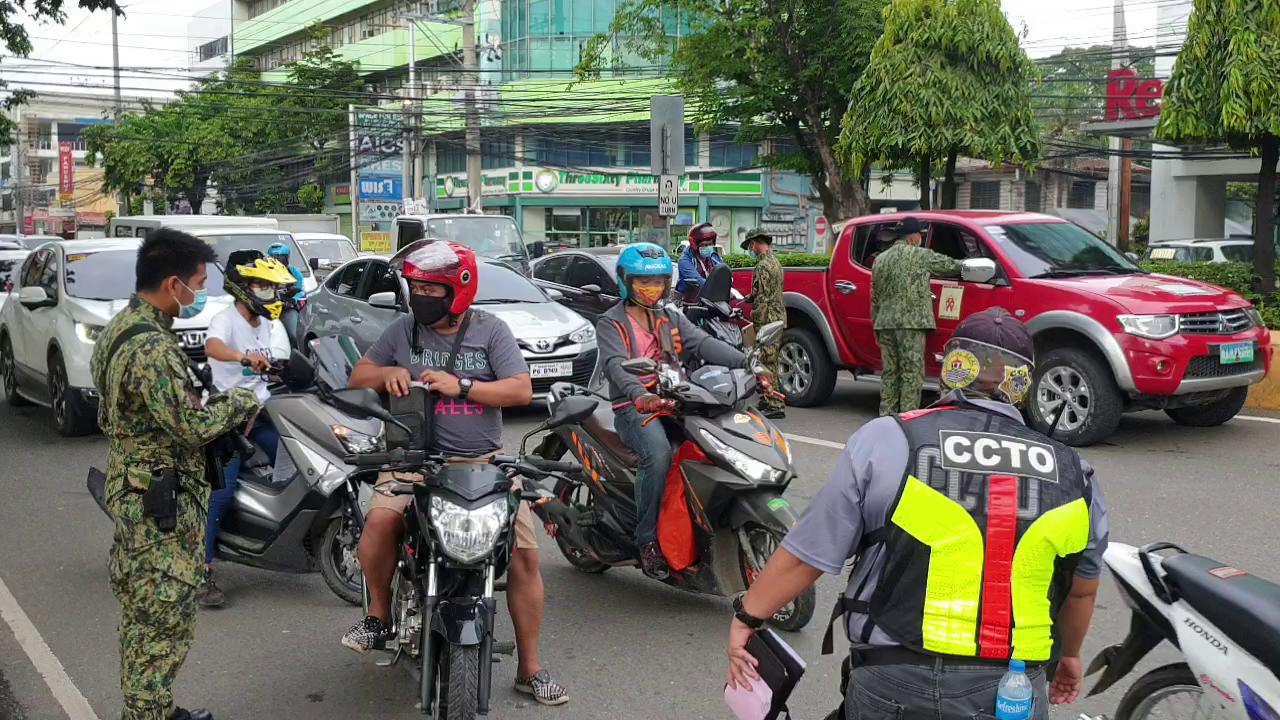Magalong to help form teams for COVID-19 contact tracing in Cebu City

Policemen in fatigue uniform conduct random checkpoints in Cebu City to make sure only authorized individuals go out of their homes to contain the spread of the new coronavirus disease (COVID-19). (DALE ISRAEL/INQUIRER VISAYAS)
CEBU CITY –– Sensing a weak spot in Cebu City’s contact tracing strategy, Environment Secretary Roy Cimatu has brought in Baguio City Mayor Benjamin Magalong to help organize teams that would identify persons who had close contact with someone infected with the coronavirus disease (COVID-19).
“There are three weapons to contain the virus: community quarantine, testing, and contact tracing. The most difficult part is the contact tracing. And that’s what Cebu City lacks. We don’t know where our targets are,” said Cimatu, who was appointed COVID-19 point person in Cebu.
Magalong, a retired police general, arrived in Cebu City on Tuesday and will leave six of his staff members to train the local government’s contact tracing teams for two weeks and help level up its strategy against the dreaded virus.
Efficient and extensive contact tracing devised by Magalong at the start of the pandemic was what saved Baguio from going downhill in the fight against COVID-19.
Baguio’s active cases did not rise higher than the 17 it had reached in April.
Article continues after this advertisementIn a virtual press conference here on Tuesday, Magalong gave a tip on how to effectively conduct contact tracing.
Article continues after this advertisement“A team should be handling just one or two COVID-19 cases. If you give them three cases, the team will be overwhelmed,” he said.
A contact tracing team, he said, should have a doctor, nurse, health worker, and a police investigator.
Cebu City Mayor Edgardo Labella earlier formed 35 teams of contact tracers with five members each.
But Magalong said the number of teams may not be enough for the city’s 80 villages.
“Contact tracing is a very stressful strategy in containing the virus. Looking at the number of cases, 35 are not enough. The more contact tracing the better,” he said.
Labella, in the same virtual presser, said he hoped to increase the number of contact tracers in the city to 80.
“Hopefully, there could be some medical practitioners to help these teams. I am glad that I have the support of the national government. We should see to it that we will have at least a thousand tests every day in the 80 barangays in the city,” he said.
Magalong lauded the Cebu City government’s continued massive testing to identify, isolate, and treat those who contracted the COVID-19.
“Proactive and expanded testing is the only way to determine the actual situation and come up with a strategic solution. If there is continued testing, there would be a significant increase in cases. You have a very proactive local government here. We don’t have to dictate them. They did a great job. We’re just here to share our best practices (in Baguio),” he said.
Magalong formed his contact tracing team in Baguio as early as the third week of March when the entire Luzon was placed on lockdown.
As a former chief of the Criminal Investigation and Detection Group of the Philippine National Police, he introduced the enhanced cognitive interviewing (ECI), a police questioning technique to get information about a crime scene from eyewitnesses and victims.
Cimatu said if Cebu City managed to implement an effective contact tracing strategy, it might reduce its number of COVID-19 infections.
“We have to catch up, locate, and identify where the virus is in Cebu,” he said.
Cebu City was first placed under enhanced community quarantine (ECQ) from March 28 to May 31. On June 1, its status was downgraded to a more relaxed general community quarantine, which led to the reopening of some businesses and public transportation.
But on June 15, President Duterte decided to put the city under ECQ again due to the rising number of COVID-19 cases as well as the city’s problem of providing critical healthcare assistance to patients.
As of July 6, the Department of Health recorded a total of 6,870 COVID-19 cases in Cebu City, where 3,750 are active. It also registered 250 deaths and 2,869 recoveries.
At least 1,636 persons are recuperating in hospitals, while 2,114 others are staying in the city’s quarantine facilities. With reports from Ador Vincent Mayol and Nestle Semilla, Inquirer Visayas
For more news about the novel coronavirus click here.
What you need to know about Coronavirus.
For more information on COVID-19, call the DOH Hotline: (02) 86517800 local 1149/1150.
The Inquirer Foundation supports our healthcare frontliners and is still accepting cash donations to be deposited at Banco de Oro (BDO) current account #007960018860 or donate through PayMaya using this link.